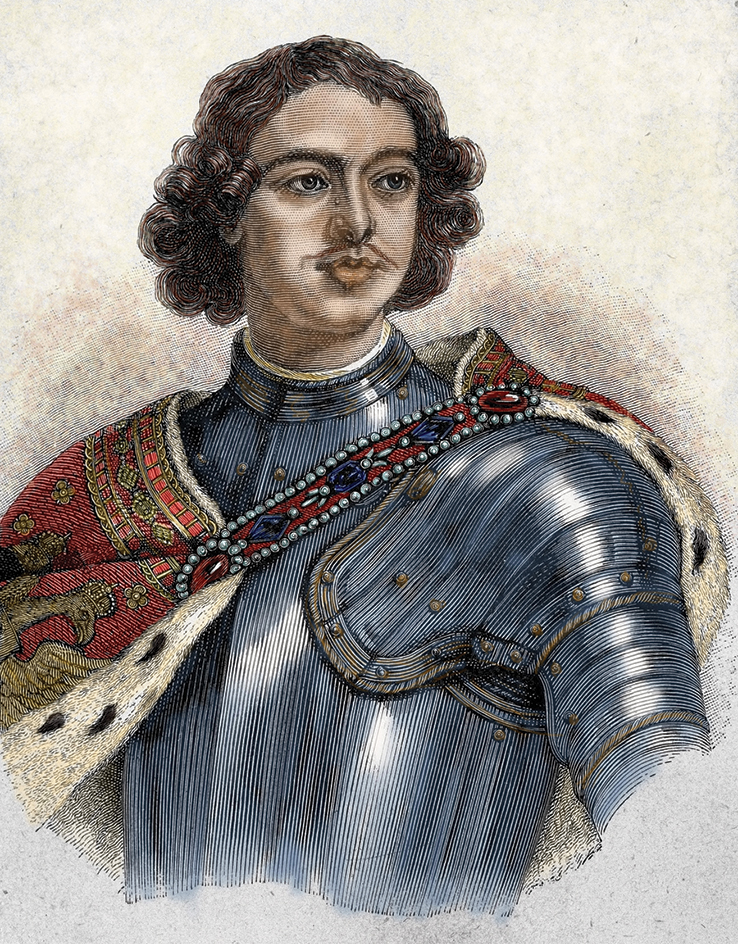Peter I, the Great (1672-1725), was one of the most famous rulers in history. A member of the Romanov dynasty (family of rulers), he ruled first as czar (king) of Russia and later became Russia’s first emperor. Peter transformed Russia from an isolated and backward country into a great European power.
Early life.
Peter was born in Moscow on June 9, 1672. His father was Czar Alexis. Alexis died in 1676 and was succeeded as czar by his oldest son, Fedor. Fedor died in 1682. Peter then came to the throne at the age of 10, along with his weak-minded half brother Ivan V. However, Peter’s half sister Sophia actually ruled Russia until 1689. Peter’s followers forced Sophia to retire that year, and Peter eventually became the sole ruler of Russia. 
Peter had been interested in military matters as a youth. He also had enjoyed spending time with foreign military officers who lived in Moscow, and he learned much about European civilization from them. In 1695, a number of these officers helped Peter lead a force against the Ottoman Empire. Peter conquered the Ottoman port of Azov on the Black Sea in 1696.
In 1697 and 1698, Peter toured Western Europe with a group of Russian delegates to seek allies for Russia against the Ottoman Empire. He traveled for about 17 months, mostly in England and the Netherlands. Peter also recruited Western experts to bring modern techniques of engineering, architecture, art, and science to Russia. Russia then lagged far behind other European nations in these areas.
A revolt of his royal guards forced Peter to return to Russia in 1698. Peter crushed the revolt. This victory made him the unquestioned master of Russia.
Foreign policy.
From 1700 to 1721, Peter led Russia in a war against Sweden. When the war began, Sweden was the leading power in northern Europe. With the help of his Western advisers, Peter improved Russia’s army, created a navy, and made his government more efficient in raising troops and money for his war effort. By the end of the war, Russia had gained control over important territory along the eastern shores of the Baltic Sea. This land gave Russia a direct approach by water to the rest of Europe.
In 1712, the Ottomans forced Peter to turn over the port of Azov and other territories taken earlier from them. However, in 1722 and 1723, Peter attacked Persia and conquered territory along the Caspian Sea. Peter’s foreign conquests helped Russia greatly to expand its trade with other countries. Peter’s conquests also enormously increased Russia’s political importance in Europe. Peter died on Feb. 8, 1725.
Policies within Russia.
One of Peter’s chief goals was to end the inefficiency and corruption in Russia’s government. Peter strengthened his power as czar and created a senate to supervise the Russian government. He began a policy of appointing people to high military or administrative offices according to merit and seniority. Previously, these appointments were based on family background. Peter also abolished the independence of the Russian Orthodox Church.
Peter’s programs led to the expansion of industry and foreign trade and the construction of new roads and canals. He also laid the basis for the Russian Academy of Sciences, started Russia’s first newspaper, and founded technical schools, a museum, a public library, and an art gallery. Because of his admiration for European society, Peter forced Russia’s nobility to adopt many Western customs.
In 1703, Peter founded the city of St. Petersburg on territory taken from Sweden. He modeled it after cities in Western Europe. Peter made St. Petersburg the capital of Russia and used it as the focus of his efforts to “Westernize” Russian life.
Peter’s rule also had some harmful effects. To finance his military campaigns and domestic reforms, Peter imposed high taxes on the Russian people. He also dealt harshly with people who opposed the reforms. Peter forced many Russians to work against their will in his mines and factories and on building projects. Peter also extended serfdom, a system under which the majority of Russian peasants lived in conditions little better than slavery (see Serf).
See also Romanov; Saint Petersburg.
